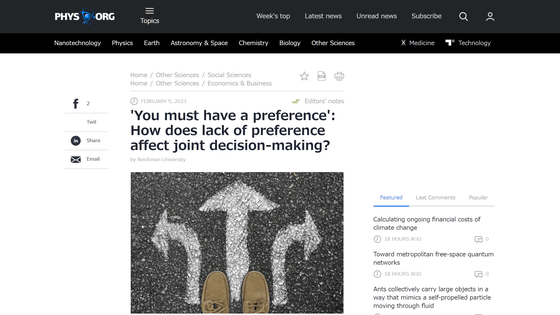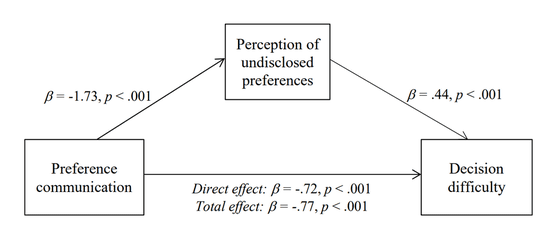Research results show that answering 'I don't care' reduces the other person's likeability.

Many people have had the experience of leaving the choice to the other person when asked, ``What do you want for lunch?'' and saying, ``Anything is fine.'' A research team at
You Must Have a Preference: The Impact of No-Preference Communication on Joint Decision Making - Nicole You Jeung Kim, Yonat Zwebner, Alixandra Barasch, Rom Y. Schrift, 2023
https://journals.sagepub.com/doi/10.1177/00222437221107593

'You must have a preference': How does lack of preference affect joint decision-making?
https://phys.org/news/2023-02-lack-affect-joint-decision-making.html

Whether you're asking what you're going to have for lunch or talking about going somewhere together, say, ``I don't really care, so you can decide,'' out of a cooperative and respectful attitude. ``I'm fine with anything, so choose whatever you like'' and leave the choice to the other person. Although such communication is common, little is known about how it affects joint decision-making and consumption experiences. In a paper, a research team led by Jonat Zwebner of Reichmann University's Allison School of Management examines how such communication ultimately affects consumption and what its social utility is. I showed it.
The research team found that when it comes to communicating, ``Whatever you want,'' ``Do we take the other person's response at face value as ``indifferent,'' or do they say ``they respect us and leave it to us, rather than having no preference?'' 'Is it easier to make a decision if one party expresses the intention that it doesn't matter?' 'What impact does this type of communication have on final consumption?' ``What is the social utility of these communications?'' Several experiments have been conducted to investigate the effects of communication that leaves decision-making to the other party. did.

First, in order to select phrases that are often used when not communicating one's preferences to the other person, the research team asked 100 people online to recall ``situations in which it was difficult to make a joint decision because the other person did not make a clear choice.'' We conducted a survey and had them write down what they said. The most frequently mentioned phrase was 'I don't care,' followed by 'I don't know,' and others include 'I don't care.' Phrases that left things up to the other person were mentioned, such as ``You decide'' and ``Let's do what you like.''
Based on this, we conducted a ``mediation analysis'' to investigate whether choices and consumption experiences are affected by ``telling your preferences'' and ``leaving it to the other person without telling them your preferences'' in decision-making responses. We are conducting a ``moderated mediation analysis'' to analyze whether the inclusion of additional communication regarding preferences affects the results. Furthermore, the study divided the categories into categories such as ``movies'', ``games'', and ``information you want to know'', and found that people felt the ``joy of consuming their favorite genre'' and ``the utility of consuming a genre they did not like''. The degree of decline was recorded.

As a result, the researchers concluded, ``Answers such as ``Anything goes'' increase the difficulty for the person entrusted with the decision and reduce the respondent's likeability.'' Additionally, those tasked with making a decision tend to feel that the answerer's preferences are not similar to their own, and tend to choose options that are slightly different from their own preferences, which may affect the final result. It has also been shown that the enjoyment gained from collaborative consumption is reduced.
Zwebner says, ``When someone asks you what you like, are you willing to say, ``I like this,'' or do you say, ``I'll leave it to you'' or ``I don't really have a preference.'' ?Many of us keep our preferences hidden by trying to be less demanding and seem easygoing and pleasant to the other person.This leads to fairness, and being fair helps others and friends , or believe it will help them make a good impression at work. However, our research found that the opposite is true: choosing not to communicate your preferences is actually less likely to be shared. 'It can damage your experiences and even your relationships,' he said of the study.
A forum related to this article has been set up on the GIGAZINE official Discord server. Anyone can write freely, so please feel free to comment!
• Discord | “Have you ever made a mistake by saying things like “I don’t care”? ' | GIGAZINE
https://discord.com/channels/1037961069903216680/1161957285778686022
Related Posts:
in Note, Posted by log1e_dh







